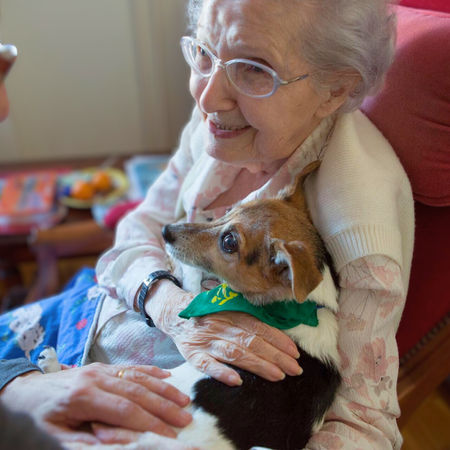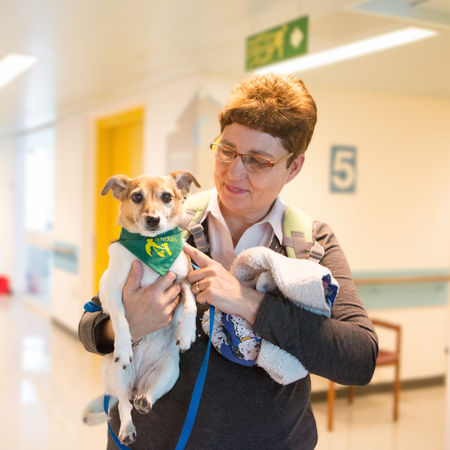
Lucie
The Frehel Fellowship is awarded posthumously to Lucie in recognition of her years of distinguished service bringing emotional support and resilience to the vulnerable.
There are presences that need no words to soothe, comfort, or uplift.
Lucie was one of them.
Quiet, yet radiant. Unassuming, yet indispensable.
With a natural gentleness, she stood, year after year, beside those touched by vulnerability. In care homes, alongside children, the elderly, and people living with disabilities, Lucie didn’t “work” — she gave. A steady gaze, a silent companionship, a vast and generous heart. What she achieved, hand in paw with Mary-Claude, goes far beyond visits.
Lucie embodied a bond as old as time — that between animals and humans — when rooted in trust, dignity, and love.
Mary-Claude recalls this shared journey with heartfelt clarity: “Lucie, my darling Lucie… You loved those visits; as soon as I put on your collar, you knew you were going to ‘work’. For you, Lucie, I carried on with Pattes Tendues. And in every training session, I speak of you…” Lucie was not human, and yet her compassion was profoundly human. She wasn’t a caregiver in the formal sense, yet she brought care — with quiet wisdom, unwavering presence, and a warmth that transformed the spaces she entered. Her path, calm yet deeply felt, sowed dignity, reassurance, and, sometimes simply… joy.
Through this Frehel Fellow Award, awarded posthumously, the Noble Alliance pays tribute to all that Lucie gave — softly, but with lasting impact.
Today, she joins the living memory of those exceptional companions whose very presence gently restores what is most essential in us.
To Lucie — for a legacy both silent and luminous.
A Life of Service
Dear Lucie,
Today, the Noble Alliance Association honours you posthumously with the 2025 Frehel Fellow Award, recognising your exemplary dedication to those most vulnerable.
For many years, alongside Mary-Claude, you entered care homes, institutions, and specialised centres, offering something few can give with such steadfastness: a genuine presence.
Without uttering a word, you brought reassurance. Without making promises, you offered comfort. You read silences, eased tensions, and restored confidence. You were not a professional carer — yet you cared deeply. You were not human — yet profoundly human in all you conveyed.
Your way of “working” was never a duty. It was a gift. The moment your collar was put on, you understood your mission and carried it out calmly and seriously, without ever tiring.
To Mary-Claude, you have been a constant companion, a steady presence, and an indispensable support. She often speaks of you during training sessions, and those who listen quickly grasp the importance of your bond.
The Frehel Fellow Award honours animals whose commitment has helped to uplift the humanity of those they have encountered. You are fully among them. Through your quiet but profound presence, you have left a lasting mark on the hearts of many. Today, we pay tribute to you.
With respect, gratitude, and affection.
Noble Alliance

Some presences need no words to soothe, to comfort, to uplift. Lucie was one of them.
Alongside Mary-Claude, she moved with grace and kindness through the corridors of care and human fragility. She offered, unconditionally, what so many seek: a silent presence, a gaze free of judgement, a warmth that asked for nothing in return. Lucie was not a carer, yet she brought healing. Not human, yet deeply human in all that she conveyed.

Photo courtesy of Mary-Claude Pellaux
Mary-Claude tells their story in these words:
“Lucie, my darling Lucie, with whom I discovered the wonderful association Pattes Tendues back in 2005 — already twenty years ago. One day, I saw an advert in the paper: they were looking for volunteers to visit people in care homes or those living with disabilities. Lucie was on my lap, and I said to her, ‘What do you think? Shall we give it a try?’"

Your beautiful eyes said yes.I rang Mrs Francine Joseph-Murphy, who sent us a questionnaire. We passed the assessment, took the five-day training course (we’ve since added a sixth), and began our visits at the Charmilles care home in early 2006 — where we continued for almost ten years.We also visited Clair-Bois Chambésy for five years — you loved the children there — and for three years, Sylvia’s salon for people with cognitive impairments.Lucie, you loved those visits; the moment I put your collar on, you knew you were going to ‘work’.For you, Lucie, I carried on with Pattes Tendues. And with every new course, I still speak of you…”

Though she has now left this world, Lucie’s imprint remains. Through her quiet presence, her gentle manner, and her unique gaze, she reminded us all that the bond between animals and humans can be a true force for good.

Lucie showed that the soul we are born with — the one meant to shine — knows no age; she continued her visits well into old age. And love, she proved, knows no species boundaries.
It is for this reason that Noble Alliance is honoured to posthumously bestow upon her the Frehel Fellowship Award — a distinction that recognises animals whose devotion has elevated the humanity of those they encountered.

Lucie thus enters the living memory of those extraordinary companions — beings whose simple presence quietly restores what is most essential within us. To Lucie, for her luminous, silent legacy.

Power in Action
55000
Animal-assisted activities delivered by Pattes Tendues — Lucie was one of the first to take part.
68
Active therapy dogs in Pattes Tendues today — Lucie helped pave the way.
15
Is the number of years of dedicated visits to people in vulnerable situations.
What Are Animal-Assisted Therapy Dogs?
They’re not pets on a visit. They’re trained partners in care.
Animal-assisted dogs are specially selected and trained to take part in structured programmes that support people facing physical, emotional, or psychological challenges. Working alongside qualified handlers, they engage in activities that reduce anxiety, break isolation, build trust, and restore connection — especially in hospitals, care homes, disability centres, and schools.
Each visit is purposeful. Each interaction is part of a wider effort to make care more human, more accessible, and more effective.
Animal-assisted dogs don’t provide entertainment. They provide presence — the kind that reaches people where words often don’t.
Animal-Assisted Therapy: Framework, Effects, and Scientific Evidence
Animal-Assisted Therapy (AAT)
refers to a structured intervention in which an animal is integrated into a therapeutic process led by a qualified healthcare professional, with the aim of improving the physical, mental, or social well-being of the recipient.
Documented Effects of AAT in Scientific Literature
Robust research from various disciplines — including geriatrics, psychiatry, palliative care, and paediatrics — has substantiated the clinical benefits of AAT:
Reduction of Anxiety and Pain
A systematic review by Santaniello et al. (2020) found that the presence of an animal within a therapeutic context significantly reduces stress markers and levels of anxiety in hospitalised patients (PMC7185850).
Improvement in Depressive Symptoms among Older Adults
A recent meta-analysis by Zhang et al. (2024) demonstrates that animal-assisted interventions have a moderate but significant effect on depression among older adults, whether living at home or in residential care (PubMed ID: 38232905).
Positive Impact on Cognitive Function
A systematic review published in 2023 explores interventions for patients with neurodegenerative conditions (Alzheimer’s, stroke), highlighting improvements in well-being, social interaction, and temporal orientation (BMC Systematic Reviews).
Strengthening of Social Bonds and Reduction in Isolation
A comprehensive study published in JMIRx Med (2024) compiled the psychosocial effects of AAT, noting enhancements in mood, self-esteem, and interpersonal skills (JMIRx Med). Animal-Assisted Therapy is now a credible complementary approach, backed by empirical evidence. While the exact mechanisms underlying its efficacy continue to be explored, the findings consistently point to tangible benefits for mental, social, and emotional health — particularly among the most vulnerable populations.
Selected References
Santaniello, A., Rossi, A., & Conti, F. (2020). Effects of Animal-Assisted Therapy on Anxiety and Pain in Hospitalized Patients: A Systematic Review. Frontiers in Psychology. https://doi.org/10.3389/fpsyg.2020.01810 (PMC7185850)
Zhang, Y., Li, X., & Chen, S. (2024). Meta-analysis of Animal-Assisted Interventions on Depression in Older Adults. Journal of Affective Disorders, 320, 123–130. https://pubmed.ncbi.nlm.nih.gov/38232905/
BMC Systematic Reviews. (2023). Animal-Assisted Interventions in Neurodegenerative Diseases: Impact on Cognition and Social Interaction. BMC Systematic Reviews, 12(1), 45. https://doi.org/10.1186/s13643-023-02100-0
JMIRx Med. (2024). Psychosocial Effects of Animal-Assisted Therapy: A Synthesis Across Clinical Settings. JMIRx Med, 5(2), e32144. https://doi.org/10.2196/32144
Behind the Scenes


















